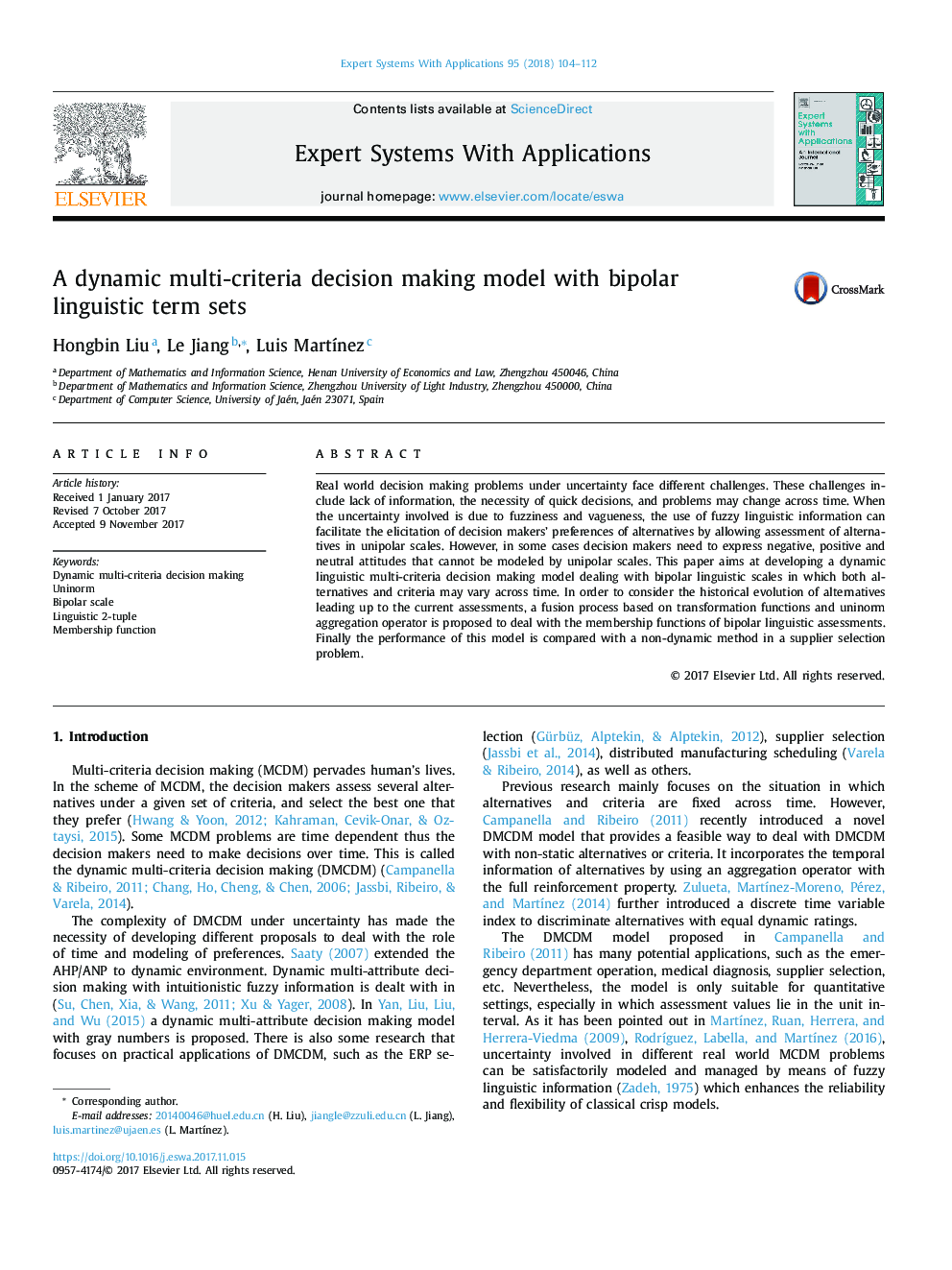| کد مقاله | کد نشریه | سال انتشار | مقاله انگلیسی | نسخه تمام متن |
|---|---|---|---|---|
| 6855288 | 1437611 | 2018 | 9 صفحه PDF | دانلود رایگان |
عنوان انگلیسی مقاله ISI
A dynamic multi-criteria decision making model with bipolar linguistic term sets
ترجمه فارسی عنوان
مدل تصمیم گیری چندمتغیره پویا با مجموعه های اصطلاح زبانی دوقطبی
دانلود مقاله + سفارش ترجمه
دانلود مقاله ISI انگلیسی
رایگان برای ایرانیان
کلمات کلیدی
ترجمه چکیده
مشکلات تصمیم گیری واقعی در جهان نااطمینانی با چالش های مختلف روبرو هستند. این چالش ها عبارتند از کمبود اطلاعات، ضرورت تصمیم گیری سریع و مشکلات در طول زمان ممکن است تغییر کند. هنگامی که نااطمینی درگیر ناشی از فازی و ناامن است، استفاده از اطلاعات زبانشناختی فازی می تواند باعث ایجاد گزینه های تصمیم گیرندگان از گزینه ها با اجازه دادن به ارزیابی جایگزین ها در مقیاس یکپارچه شود. با این حال، در برخی موارد تصمیم گیران باید نگرش منفی، مثبت و بی طرف را بیان کنند که نمیتوان با مقیاس یکپارچه مدلسازی کرد. این مقاله با هدف توسعه یک مدل تصمیم گیری چند معیاره زبان شناختی پویا در برخورد با مقیاس های زبانی دو زبانه که در آن هر دو گزینه و معیار ممکن است در طول زمان متفاوت باشد. برای در نظر گرفتن تکامل تاریخی جایگزینی که منجر به ارزیابی های جاری می شود، یک فرآیند تلفیقی مبتنی بر توابع تبدیل و اپراتور تجمعی غیرمعمول پیشنهاد شده است تا با تابع عضویت در ارزیابی زبانی دو قطبی مواجه شود. در نهایت عملکرد این مدل با یک روش غیر پویا در یک مشکل انتخاب تامین کننده مقایسه می شود.
موضوعات مرتبط
مهندسی و علوم پایه
مهندسی کامپیوتر
هوش مصنوعی
چکیده انگلیسی
Real world decision making problems under uncertainty face different challenges. These challenges include lack of information, the necessity of quick decisions, and problems may change across time. When the uncertainty involved is due to fuzziness and vagueness, the use of fuzzy linguistic information can facilitate the elicitation of decision makers' preferences of alternatives by allowing assessment of alternatives in unipolar scales. However, in some cases decision makers need to express negative, positive and neutral attitudes that cannot be modeled by unipolar scales. This paper aims at developing a dynamic linguistic multi-criteria decision making model dealing with bipolar linguistic scales in which both alternatives and criteria may vary across time. In order to consider the historical evolution of alternatives leading up to the current assessments, a fusion process based on transformation functions and uninorm aggregation operator is proposed to deal with the membership functions of bipolar linguistic assessments. Finally the performance of this model is compared with a non-dynamic method in a supplier selection problem.
ناشر
Database: Elsevier - ScienceDirect (ساینس دایرکت)
Journal: Expert Systems with Applications - Volume 95, 1 April 2018, Pages 104-112
Journal: Expert Systems with Applications - Volume 95, 1 April 2018, Pages 104-112
نویسندگان
Hongbin Liu, Le Jiang, Luis MartÃnez,
